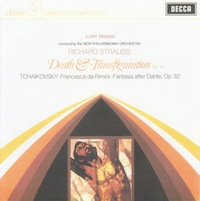 CD 22
CD 22 [73:12]
Richard STRAUSS
Tod und Verklärung, Op. 24
Peter Il’yich TCHAIKOVSKY
Francesca da Rimini, Op. 32
Sergei PROKOFIEV
Piano Concerto No. 3 in C, Op. 26
Israela Margalit (piano)
New Philharmonia Orchestra/Lorin Maazel
rec. 1971
First released on LP as PFS 4227 (November 1971) and PFS 4255 (January 1973)
I should be pleased to see the late Lorin Maazel represented here; after all he and the Wiener Philharmoniker recorded fine Tchaikovsky and Sibelius cycles for Decca, both sets of which are still highly regarded today. I’d be the first to admit he was a notoriously variable conductor, as his first Mahler box for Signum demonstrates (
review). On form, as he was in his recent Concertgebouw Mahler Sixth, he’s electrifying (
review). Alas, many critics still can’t – or won’t – acknowledge his successes.
I must confess I’ve not heard Maazel in Richard Strauss or Prokofiev, so these Phase 4 recordings – taped in Barking Town Hall, of all places - will be interesting to say the least. As it turns out this
Tod und Verklärung is one of the most bizarre performances I’ve ever encountered. The first few minutes are characterised by clipped phrases and the usual engineering shenanigans. The recording is lifeless, and it seems the music has been freeze-dried and vacuum-packed for quick, uncritical consumption. Frankly, if this had been my introduction to Maazel I’d be an unrepentant nay-sayer too.
Alas, the Tchaikovsky isn’t much better. This is the kind of garish, almost brutal recording that I simply can’t abide. The treble has a razored edge and the performance itself is unpardonably crude. Admittedly
Francesca da Rimini is prone to excess at times, but it does have deep wellsprings of strength and passion that can be channelled to thrilling effect. Neither is in evidence here, I’m afraid; really, this has to be one of the very worst performances/recordings in this already blighted box.
What of the Prokofiev? Despite a change of venue – the usually reliable Walthamstow Assembly Hall - we’re back to the airless sound of the Strauss. Not only that, Israela Margalit’s piano sounds so puny it could be a child’s toy. I kid you not, the nightmare just got a whole lot worse. Conductor and soloist seem oddly detached too, the very antithesis of Kurt Masur and Michel Béroff in their scintillating Warner set. Indeed, the latter give one of the most satisfying accounts of this concerto I’ve ever heard. Alongside the mercurial Béroff pianist-turned-writer Margalit appears to be doodling; even worse, the New Philharmonia come across as a third-rate band.
If I were to assemble just one group of performances to illustrate how awful Maazel could be this would surely be it. As for those listeners who think Phase 4 marked some kind of high-water mark in recorded sound – oh yes, there are plenty of them about – I’d lash them to a hard chair and force them to listen to this disc. Once should do it; it nearly did for me.
It’s official; this is the most lamentable disc in the box to date.
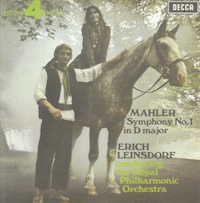 CD 23
CD 23 [75:24]
Gustav MAHLER
Symphony No. 1 in D
Richard WAGNER
Tannhäuser: Overture and Venusberg Music (concert version)
Royal Philharmonic Orchestra, London Symphony Orchestra/Erich Leinsdorf
rec. 1969/71
First released on LP as PFS 4187 (July 1970) and PFS 4232 (March 1972)
After extolling Maazel’s virtues in the preamble to my previous review I’m now going to proceed more carefully. I will say that Erich Leinsdorf has seldom disappointed me in the past, and his RCA coupling of Mahler’s
Symphony No. 1 and Richard Strauss’s
Four Last Songs – the latter with Leontyne Price - is actually rather good. The Mahler is direct and unaffected, and although Price – like Norman - is a bit gusty in the Strauss her creamy tones are a joy to hear.
I revisited that Boston Mahler 1 in preparation for this review and was struck anew by the sheer beauty of the playing, especially when our hero steps – blinking in wonderment - from gloom to glade. The RCA recording is splendid and Leinsdorf’s speeds and tempo relationships are well judged. Most important there’s a wonderful sense of narrative, something that’s not achieved as often as it should be. Alas, the Phase 4 performance is but a pale shadow of this one; the RPO sound thin by comparison and the recording is somewhat shallow. Even Leinsdorf seems to be having an off day, and the symphony progresses in a curiously random and lacklustre fashion.
In the latter – recorded in Kingsway Hall - the
Frère Jacques tune begins way over in the right channel, the rest of the orchestra gradually filling in from the left. It’s exaggerated and unnecessary, but then musical values aren’t pre-eminent here. They certainly are in the Boston performance, which glows with all the warmth and affection the London one lacks. There are glimpses of magic in the latter, but that’s scant compensation when the performance is otherwise so ordinary. I’m pleased to say things improve in the finale, which has all the energy and focus this music requires. The yelping horns at the close are mighty impressive, too.
The catalogue is stuffed with fine versions of this symphony, Leinsdorf’s Boston account among them. I’m not always drawn to Klaus Tennstedt’s later Mahler recordings – they’re too anguished for my tastes – but his BBC Legends
First is still the most complete distillation of this great score that I know (
review).
The disc ends with a pretty decent performance of Wagner’s
Tannhäuser overture and Venusberg Music. Leinsdorf conveys much of the overture’s dignity and strength, and the Venusberg music weaves its usual spell. The LSO seem a tad underpowered in the tuttis – that may have more to do with balances than player numbers – but they are on good form. I just wish the sound would open out a little, adding some much-needed amplitude to the proceedings. Still, the recording is far less compromised than usual. This engaging concert piece – which lasts around 22 minutes – makes a most attractive coupling.
Leinsdorf’s Boston Mahler 1 is far preferable; the Wagner is worth hearing, though.
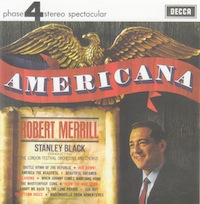 CD 24
CD 24 [43:04]
Americana
Robert Merrill (baritone)
The London Festival Orchestra & Chorus/Stanley Black
rec. 1965
First released on LP as PFS 4069 (November 1965)
This CD, a collection of traditional, folk and patriotic tunes from across the Atlantic, is built around the American operatic baritone Robert Merrill. The London Festival Orchestra and Chorus, led by the ubiquitous Mr Black, provide the backing. I was pleasantly surprised by the relatively ‘straight’ rendition of the opening
Battle Hymn of the Republic; Merrill is a firm – if rather closely miked – soloist and the chorus sing well. Only at the very end does Merrill sound a tad overstretched. He’s very affecting in
America The Beautiful, as are the chorus. Both tunes even speak to a wizened old cynic like me.
Black’s straw-strewn, fiddle-riddled version of
Hoe Down! has a similar effect; played and sung with great gusto it’s very entertaining indeed. Foster’s
Beautiful Dreamer gets a warmly expressive outing and Merrill sings
Oklahoma! as if to the manner born. Kudos to Mr Black too, for he does this sort of thing rather well. The Civil War song
When Johnny Comes Marching Home – which gets off to a rather scrappy start - improves thereafter. The choral ‘Hurrahs!’ are somewhat fierce, but the raucous marching band –
à la Ives - is nicely done.
Hmm, this is turning out to be quite enjoyable. These are generally such upbeat and smile-inducing tunes, played and sung with such obvious affection and good humour. The engineers have gone for a cinema-style presentation, with crowd and other ‘noises off’ that add to the sense of occasion. Foster’s
Camptown Races – never quite the same since Mel Brooks’s
Blazing Saddles – is a case in point. Merrill is way over the top and the banjo is a nice touch. Staying with the Wild West, Carson Robison’s cowboy ballad
Carry Me Back to the Lone Prairie is as evocative as it gets. Messy fade at the end, though.
Moving into the 20th century we get a delicious rendition of
The Whiffenpoof Song, the signature tune of
a cappella group The Yale Whiffenpoofs. Then there’s Meredith Willson’s
Ask Not, which takes its cue from JFK’s famous inaugural address. It probably had more resonance in the 1960s than it does now, but it’s still a rousing tribute to the good ol’ US of A.
Really quite entertaining; nice one, Stanley.
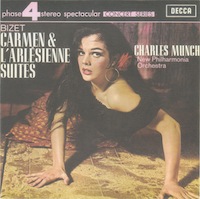 CD 25
CD 25 [46:02]
Georges BIZET
Carmen Suite (excerpts from suites 1 & 2)
L'Arlésienne Suite No. 1
New Philharmonia Orchestra/Charles Munch
rec. 1967
First released on LP as PFS 4127 (September 1967)
The recorded legacy of Charles Munch, music director of the Boston Symphony from 1949 to1962, is celebrated in a number of big boxes from RCA. Here he teams up with the New Philharmonia in a programme of what he does best - French music. This recording – made in Kingsway Hall – includes excerpts from Guiraud’s two
Carmen Suites, although I see from a Decca Weekend CD that Munch actually recorded them both; ditto the
L'Arlésienne Suites, only the first of which is presented here.
The
Carmen selection begins with a heady account of
Les Toréadors, which contains some of the opera’s most famous tunes. Guiraud’s orchestrations are well served here; the
Aragonaise is wonderfully mobile and the dreamy
Intermezzo is a delight. The New Philharmonia play rather better for Munch than they did for Maazel (CD 22), although the recording is a bit dry. The exaggerated left/right balances are very noticeable, especially in the opening bars of the
Habanera and
La Garde Montante, and tuttis are apt to leap out of the mix more forcefully than they would in the concert hall. There’s some lingering reverb at the end of the
Habanera, but it’s difficult to tell whether it’s natural or added.
These are fine performances, right up there with Ansermet and the OSR, and the recording offers a good blend of weight and clarity. The
Danse Bohème has terrific point and polish – Munch really does this rep so well – and there’s a zest to the music-making that’s most welcome. The first
L'Arlésienne Suite is no less recommendable; indeed, the
Prélude and
Minuetto are so strongly characterised compared with the beautifully wrought but fastidious Yamada/OSR recording (
review). Munch’s
Adagietto has pleasing shape and line, despite what sounds like a deliberate boost in louder passages.
Alas, that extra lift makes for quite a forceful - even fierce –
Carillon. This sudden coarsening of the sound – tuttis are inclined to shriek - comes as a surprise after what started out as a fairly civilised recording. The
Farandole is also a tad aggressive – the upper strings especially so – but those attention-getting pitter-pats are very well done. Whatever reservations I might have about the sound they don’t detract from these thrilling, very idiomatic performances.
Merveilleuse; Munch at his considerable best.
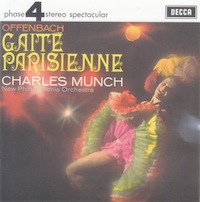 CD 26
CD 26 [83:13]
Jacques OFFENBACH
Gaîté Parisienne (arr. Manuel Rosenthal)
Ottorino RESPIGHI
Pines of Rome
Fountains of Rome
New Philharmonia Orchestra/Charles Munch
rec. 1965/67
First released on LP as PFS 4096 (October 1970) and PFS 4131 (January 1968)
Given that Munch and the New Philharmonia proved to be such a good partnership in CD 25 I was eager to hear them in this well-filled CD. Arthur Fiedler’s two RCA recordings of
Gaîté Parisienne – one mono, one stereo – need no introduction; neither should arranger Manuel Rosenthal’s 1996 account with the Monte-Carlo Philharmonic (Naxos). The Respighi pieces are the wild card here; they are also available on a single CD coupled with Doráti’s fine
Rossiniana from CD 10.
The Offenbach certainly gets off to a high-kicking start, even if the playing and recording have a little more edge than I’d like. As before the music-making is what really matters, and it’s impossible not to warm to this spirited performance. Fiedler and Rosenthal are both rather special, but if you like this score delivered with breathtaking brio Munch is the man for you. The New Philharmonia are highly responsive, and even in the fastest passages they don’t put a foot wrong. I particularly like the way this team leans into those big, swoony waltzes. As for the giddy
chic of the
Cancan it made me laugh out loud. Anyone care to re-master this and release it as a high-res download?
Goodness, I needed to lie down in a darkened room after that. I haven’t enjoyed
Gaîté Parisienne so much in ages, so let’s hope Munch and his suitably psyched players do as well with their Respighi. The start of
Pines is bright and the soundstage seems very narrow; also, less-than-subtle highlighting makes some instruments sound far too prominent. Munch is pretty swift – matter of fact, even - in the
Villa Borghese movement, becoming ponderous near the
Catacombs. I really longed for the vivid colours and latent energy that others find in this score. Munch is too soft edged both here and in the
Pines of the Janiculum; in fact the latter sounds more like Debussy than Respighi.
The engineers’ decision to banish the start of the final movement to the dim recesses of the right channel is bizarre. In just about every other recording I’ve heard the approaching legions hove into dusty view
without such oafish intervention. Moving on the
Fountain of the Villa Giulia is beautifully drawn, although I still feel that Munch isn’t entirely comfortable with Respighi’s warm, rather bold, colour palette. Surely the Triton fountain should gush and spray with rather more abandon than this? That worrying sense of inhibition isn’t helped by a very congested, narrowly focused recording.
The Offenbach plays to Munch’s strengths, the Respighi doesn’t; the sound varies from dire to decent.



 All Nimbus reviews
All Nimbus reviews








